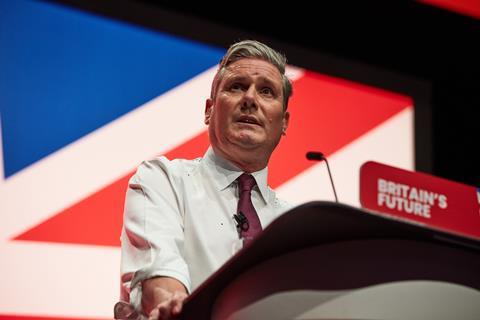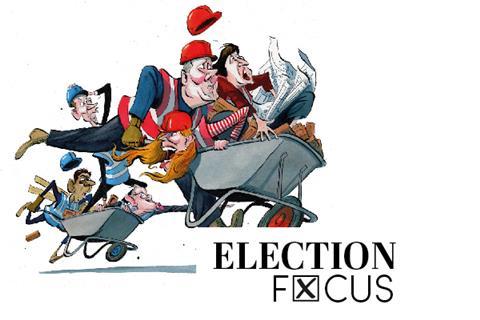Party would start projects within months of winning the July election as it re-commits to decarbonise grid by 2030
Labour has set out its green energy plan for its first year in power with the party pledging to get projects started within months of winning the 4 July election.
The party has re-confirmed its pledge to set up a publicly owned company called Great British Energy, based in Scotland, which would drive forward green infrastructure projects with the aim to decarbonise Britain’s electricity supplies by 2030.

It would be funded through a windfall tax on big oil and gas firms which is expected to raise £8.3bn over the next five years.
A new National Wealth Fund would also upgrade existing functions of the UK Infrastructure Bank and the British Business Bank to invest in ports, gigafactories, green steal, industrial clusters and hydrogen.
Policies in Labour’s first year in government would include reforming the planning system to remove an effective ban on onshore wind projects with the aim of doubling the amount of turbines to 35 GW a year.
Solar power would be tripled to 50 GW a year, offshore wind would be quadrupled to 55 GW a year by 2030, and the Conservative government’s target on green hydrogen would be doubled to 10 GW.
New floating offshore wind schemes would also be pioneered with fast-tracked projects aiming to provide 5 GW.
The party said it would build new nuclear power stations at Hinkley and Sizewell, extend the lifetime of existing plants and back new forms of nuclear power including small modular reactors.
The fleshed-out plan, first unveiled last year, was announced this morning in Scotland by Labour leader Keir Starmer and Scottish Labour leader Anas Sarwar.
It has been welcomed by Greg Jackson, founder of energy company Octopus, who said the firm was “pleased to see that they plan to fund a clean energy future by taxing the oil and gas giants.”
Former chief scientific advisor Patrick Vallance also threw his support behind the plans, which he said were achievable and could be “done fast”.
>> Read more: General election 2024: who will get your vote?
>> Read more: Labour would merge National Infrastructure Commission and Infrastructure and Projects Authority
Vallance appeared to criticise Conservative plans to delay the implementation of some net zero policies, warning: “If we choose to go slowly others will provide the answers and we will ultimately end up buying the solutions.”
But the Conservatives have attacked the plan as “mad, bad and dangerous”.
The current government is promising to decarbonise the grid by 2035, a target which would be brought forward five years under Labour. Last year a third of the UK’s electricity was still generated from fossil fuels.
Conservative energy secretary Claire Coutinho said Labour’s plans were unfunded and attacked the party’s pledge to stop new oil and gas licences in the North Sea.
The Scottish National Party also criticised the proposals, describing them as a “con trick” which would “deter billions of pounds of investment”.
But the Green Party has said Labour’s policies do not go far enough, highlighting the latter’s decision to water down a promise to spend £28bn a year on green projects.
Election focus

With the UK set for a general election on 4 July, the country is facing some serious problems.
Low growth, flatlining productivity, question marks over net zero funding and capability, skills shortages and a worsening housing crisis all amount to a daunting in-tray for the next government.
This year’s general election therefore has very high stakes for the built environment and the economy as a whole. For this reason,
��ɫ����TV’s election coverage aims to help the industry understand the issues and amplify construction’s voice so that the parties hears it loud and clear.



























No comments yet